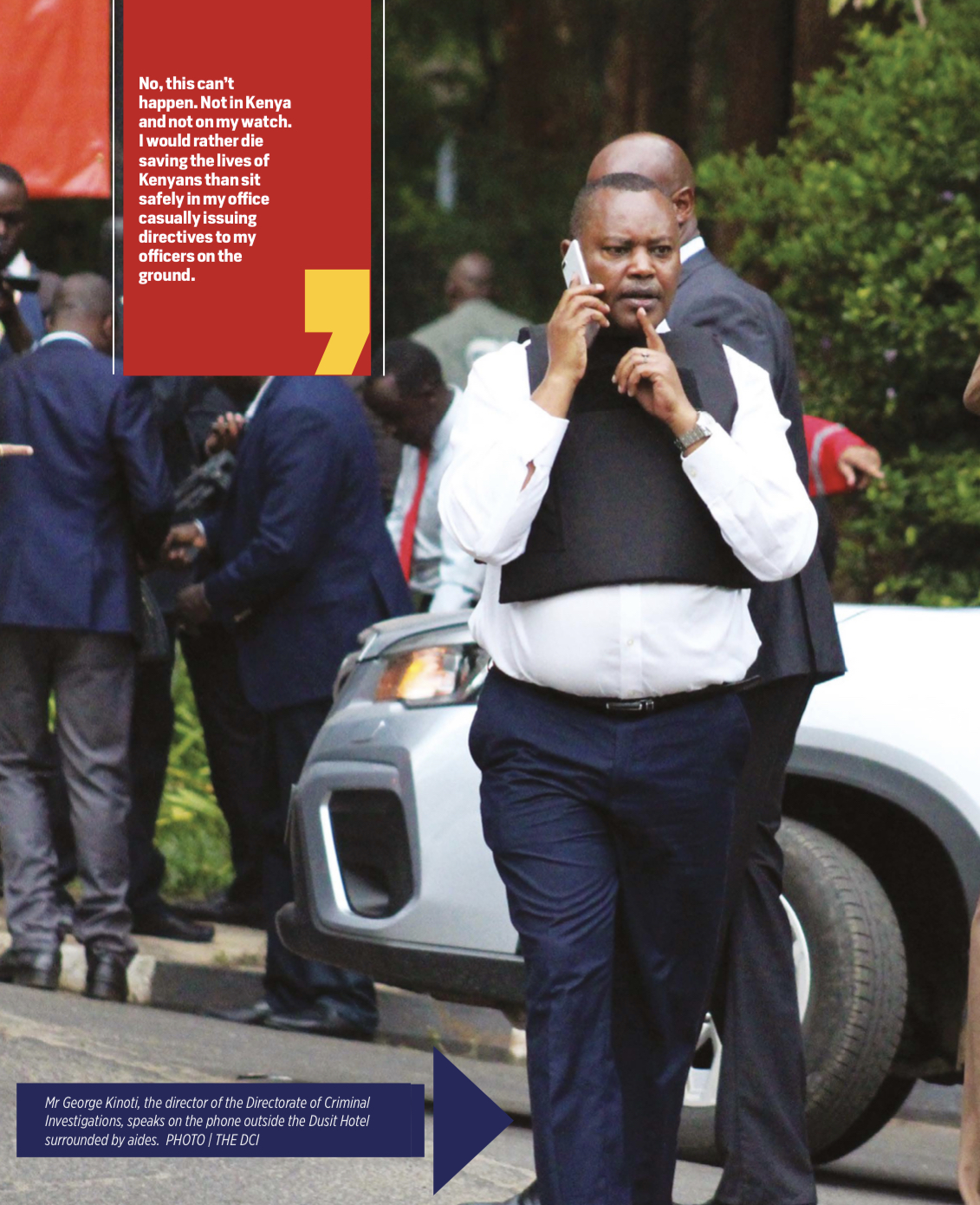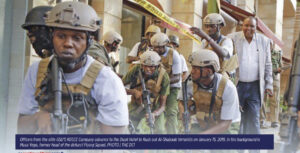Investigations
Kinoti’s 16-Hour Heroic Gun Battle With Deadly Terrorist Gang
Published
5 years agoon

THE IMAGES ON HIS MIND were horrifying and blood-chilling. Like a slow-motion horror movie, he imagined watching men, women and children falling to a hail of bullets.
“No, this can’t happen. Not in Kenya and not on my watch!” he told himself before springing into action.
A call from a key security agent had woken Kenya’s top detective George Kinoti from an after-lunch siesta nap in his 3rd floor office in Mazingira Complex, Nairobi.
He might have dosed off into the late afternoon had he not been jolted into action by the simultaneous and furious ringing of the set of phones on his desk.
Like a man stung by a bee, he staggered from his sleep. His eyes dazed and half closed, he reached for the phone that he uses to transact top secret security and intelligence matters.
His heart was racing. There was a missed call from a key security agent. With his hands sweating and fingers trembling slightly, he called the number.
Kinoti is a brave man and a tough detective. He could not understand why he was suddenly sweating or why he was trembling. He waited for the contact to pick up his call.
“George, we are under attack!” the agent on the other end barked into the ear of the director of the Directorate of Criminal Investigations (DCI). Before he could ask what was going on, the agent continued: “Al-Shabaab terrorists are killing people at the Dusit Hotel.”
Dusit is a beautiful, luxurious upmarket hotel with offices, frequented by Kenya’s wealthiest, foreign envoys, dignitaries and staffers of international NGOs who love holding their meetings and conferences there.
Kinoti had twice visited the luxury complex, in the upscale Westlands neighbourhood on 14 Riverside Drive. His heart froze when he realised why the hotel was a terrorists’ target – hitting at the heart of the wealthy and foreigners.
Now wide awake but still absorbing the shock news, the DCI chief frantically rang the Inspector General of the National Police Service Joseph Boinett.
The police boss informed Kinoti that he had just been alerted. He was busy mobilising the General Service Unit’s RECCE Company to head to the scene to lead in the counterassault. The RECCE Company comprises specialised trained anti-terrorist personnel in GSU.
“Terrified people trapped inside the luxury complex had started calling friends and relatives, describing how the terrorists were shooting dead their victims,” Kinoti recalls.
Kinoti could have chosen to sit in his carpeted and air-conditioned office coordinating the security operation on phone. But he had never been an armchair operator.
He recalls how he literally flew down the flight of stairs into the parking bay in the basement of his office block. He rapidly assembled his aides for a mission to end the slaughter. Close to 1,000 workers and guests were trapped inside the luxury complex.
He ordered a handful of his aides to wear bulletproof vests. They jumped into an armoured police vehicle and sped off to the scene of the attack.
Kinoti too wore a bulletproof vest. He was in a convoy of three vehicles. All the vehicles were loaded with various kinds of sophisticated arms.
As the DCI chief sped across the city with his heart racing, his mind was grappling with the unimaginable.
“I would rather die saving the lives of Kenyans than sit in my office issuing directives to officers at the scene,” Kenya’s top detective says when he for the first time narrated to The DCI magazine the nerve-cracking events of January 15, 2019, when Al-Shabaab militants from Somalia struck the heart of Kenya sending shockwaves globally.
The assault began at approximately 3pm when armed militants set fire to three vehicles in a parking lot outside the hotel complex.
The five attackers were armed with AK-47 rifles. They wore load-bearing vests containing grenades and ammunition. They moved from the parking lot to a courtyard where one suicide bomber self- detonated outside a restaurant, killing and injuring an unknown number of people.
Unaware they were being captured by CCTV cameras; the terrorists had meticulously moved with haste from the lobby into the hotel. They advanced inside the building, intent on killing as many innocent workers and guests as possible.
As the killing orgy raged on, dozens of terrified civilians were for hours trapped in various offices within the complex. Some kept texting relatives from their hiding places.
Trying to access the complex, which is just five kilometres from the DCI headquarters, was a nightmare for Kinoti and his team.
Sporadic gunfire and explosions emanated from the building. A bonfire of cars sent people scampering for safety with motorists fleeing from the scene of he blast. A massive gridlock hit Nairobi’s streets.
The journey from Mazingira House to the scene of the terror attack was tense and dramatic.
As Kinoti’s convoy raced through the normally congested city streets with blaring sirens, he kept thinking of the helpless Kenyans being sprayed with bullets in their motherland for a war they least understood.
His anxiety was worsened by a massive traffic snarl up as terrified motorists desperately tried to get away from the terror zone.
“I was getting increasingly worried that with every second we wasted on the road, innocent Kenyans were losing their lives,” Kinoti recalls.
“The armoured vehicle cleared the way. At one point, I alighted from my vehicle and ran with my bodyguards in toe. The driver would catch up and we would jump in.”
The DCI squad found Deputy Inspector General Edward Mbugua at the scene waiting for the RECCE squad to arrive from their base in Ruiru, almost 30 kilometres away.
A few minutes after the attack begun, live TV images captured Kinoti, clad in a bulletproof jacket and armed with a gun, with sounds of explosions and gunfire in the background. He was leading a massive security operation to flush out terrorists and evacuate survivors. His actions were a big inspiration to officers and the public.
“I could hear sporadic gunfire and people wailing inside the building. Those who managed to free themselves ran in all directions. It was like a scene from hell,” says Kinoti.
He adds: “When some of those who had gained freedom saw me, they came and told me a chilling account of what was going inside the building. They told me how the terrorists were herding people together to ensure they shot dead as many of them as possible.”
“They told me where the terrorists were located. The militants wanted to herd everyone in the building to a central location and then spray them with bullets or detonate hand grenades to inflict maximum pain on Kenyans by killing many people.”
Already, a suicide bomber had detonated a grenade at the restaurant killing himself on the spot and several Kenyans and foreigners.
The other four terrorists were pushing scores of people they had rounded up back into the building.
“I knew the RECCE squad had been held up in the massive traffic jam. I realised by the time they arrived, they wouldn’t save anybody. I devised a quick strategy to push my bodyguards into the building to distract the terrorists and save lives,” Kinoti remembers. The strategy involved fighting a psychological war with the merchants of deaths to scuttle their plans. The strategy was to disrupt their offensive to defensive, he added.
“I told my bodyguards we must get into the building and confront the enemy since all of us were wearing bulletproof vests. They thought I was crazy and told me that would be too risky,” the detective says.
He adds: “They thought I was on a suicide mission. I told them if they did not want to go into the building and face off the terrorists, I would drive myself there in the armoured vehicle. Some of the bodyguards held me. But when they realised I wasn’t joking, they agreed to drive into the building.”
Eight officers – bodyguards and Anti- Terrorism Police Unit (ATPU) officers – entered the armoured vehicle and drove into the building not sure they would ever come out alive. They approached from the restaurant area, where a grenade had just been detonated.
Kinoti had instructed them not to leave the vehicle but park it somewhere he had pointed out and fire sporadically from inside.
“Their mission was to fire continuously to create an impression help had come. The trick worked. The terrorists were caught off-guard and their plans to kill masses were thwarted,” says Kinoti.
The driver of the armoured vehicle, whom we can’t name for security reasons, says they sighted the terrorists herding civilians around the restaurant area on the ground floor.
“I told the eight officers to alight and use the armoured vehicle as a shield as they engaged the terrorists in a gun battle,” he says.
The terrorists, he says, were caught off-guard and abandoned their hostages, running into the building to take cover.
Kinoti says the terrorists fell into his trap, adding: “My officers had now put the terrorists on the defensive. The killings stopped. My officers had to figure out how to corner the terrorists but ensure the hostages who were ringed in the upper floors were not harmed.”
Being among the first responders, the DCI squad scuttled the evil plans of the terrorists before the counterterrorism teams arrived.
The DCI squad entered the restaurant and found dead bodies on the floor while others were in sitting positions.
Dozens of shaken civilians who survived the slaughter lay on the floor and it was a big sigh of relief when they saw police arrive. Some had urinated on themselves and others were too shaken to stand without support.
The RECCE and Kenya Army teams arrived when the terrorists had already been disrupted by the brave DCI men.
Outside, Kinoti and Mbugua briefed the rescue groups. It was agreed they would do a coordinated security operation to avoid the confusion similar to the Westgate Mall attack, where terrorists engaged in a chilling mass slaughter before four of them were shot dead by police rescue teams.
At least 67 people died when Al Shabab militants attacked the Westgate Mall in Nairobi, in September 2013, in a bloody four-day siege. That was five years before Kinoti became the DCI.
On October 30, 2020, Nairobi Chief Magistrate Francis Andayi sentenced two men to 33 and 18 years in prison for their roles in the Westgate Mall attack.
The Nairobi US Embassy’s Special Programme for Embassy Augmentation Response (SPEAR), team also responded to the Dusit Hotel attack, coordinated with Kenyan tactical units, and assisted in security logistics.
Kinoti and GSU chief
“I had given my bodyguards a communication call signal and I had been in communication with them. I told the RECCE, military and other rescue teams we had to approach the building with caution not to endanger the lives of my officers,” recalls Kinoti with a smile he could not afford at the time.
The DCI chief held consultations with GSU Commandant Douglas Kanja and they agreed that Kanja takes over the rescue and security operation. Only the RECCE squad was allowed to enter the building to provide a back up to the advance team from the DCI.
A crowded rescue team inside the building would have put the lives of the officers and the hostages at risk if a gunfight arose.
The military men and other rescue teams were requested to remain on stand by.
“I entered the building in the company of the RECCE squad. I was armed with a machine gun ready to save lives and defend my country,” Kinoti says, slowly shaking his head.
Kinoti adds: “Immediately we entered the restaurant, we got a first-hand experience of the magnitude of the terror. We found corpses strewn all over and pieces of human fresh, which we believed belonged to the slain suicide bomber.”
“I saw a palm of a human hand. It had only three fingers. The other two had been ripped off. Forensic analysis later established the palm belonged to the suicide bomber who detonated a grenade at the restaurant.”
When Kinoti and the RECCE squad entered the building, they found the advance team had managed to push the terrorists to an area at the foot of the staircase on the ground floor.
Here, the terrorists were trapped. All the adjacent security doors were locked and nobody could go through without a security code. They had no escape route.
The driver of the armoured vehicle says: “We could see the four armed terrorists at the staircase through the translucent window glass. We couldn’t open fire aimlessly to avoid killing civilians.”
The terrorists, who had taken cover behind pillars but keeping a watchful eye on the advancing policemen, had placed grenades along the path hoping they would step on them and be blown off.
When Kinoti and the RECCE squad arrived, the DCI team gave way for the specialised officers to take charge. The RECCE team asked for the building’s map to ensure all escape routes were sealed off and to devise ways to smoke them out.
At one time, one of the terrorists emerged from his hideout and hurled a hand grenade at the RECCE team. They miraculously cheated death by a whisker.
“The grenade fell a few yards from our feet and miraculously, it never detonated. God did not want us to die,” the DCI chief says, pausing reflectively.
DCI’s Bomb Disposal Unit conducted a controlled detonation of an explosive device that had been set up on the pathway.
The security men split up and ensured all exits were sealed off. Others took up strategic positions inside the building and gave a safe passage to victims who were still holed up in the offices.
The security operation reached the nerve- cracking moment when all the hostages
had been evacuated but the armed terrorists remained defiant behind the pillars.
As if to invite the RECCE squad for a combat, the attackers would emerge from their hideout and fire sporadically at the officers. The police snipers returned fire.
GSU snipers
It boiled down to a fierce gun battle for life, might, tack, mind and soul with the terrorists. A reckless mistake on either end meant losing lives. It was a battle the police were not ready to lose at any cost.
The gunfight and standoff lasted for what looked like hours until GSU snipers came up with a strategy to break the security door that stood between them and the terrorists. Cornered, the terrorists left their hideout and moved to the upper floors.
“We already knew they had split up but we were not sure where they had hidden. In that confused state, we knew they couldn’t launch a joint and coordinated attack. But where were they hiding?”
This was the question Kinoti and his men wrestled with.
Suddenly, sounds of frenzy gunshots were heard from the upper floor. “We now knew the areas where each of them was holed up individually but we had to be tactical because they were carrying grenades. A reckless mistake would have cost us our lives,” he says.
Kinoti and the specialised squads closed in from two sides and from the top of the building and confined the terrorists in one area.
When the terrorists realised they had been ringed, a fierce gunfire erupted around 5pm and went on uninterrupted until 4am the next day.
“These terrorists were well trained. There
was no doubt they knew how to fight. One of the terrorists had his hand ripped off by a grenade but he still managed to fatally shoot one of our officers,” recalls Kinoti sadly. The slain officer was a GSU sniper.
He adds: “From the CCTV footage,
the ammunition the terrorists had when entering the building couldn’t last two hours of intense gun battle. We suspected they had a hidden armoury in the building, which they had stocked up prior to this day.”
The DCI chief says the rescue teams shot dead the first terrorist at 1am and the last one at 4am. In total, four terrorists were shot dead by the security teams. The fifth one had died at the restaurant.
By the time the guns went silent and the building was declared safe 19 hours later, 21 civilians had been killed by the terrorists and more than 50 others seriously injured.
“Although the CCTV cameras had captured five terrorists entering the building, we meticulously combed all the rooms to ensure there were no others hiding there. We could not risk assuming all had been killed until we physically established no other had arrived earlier and taken cover,” he says.
Kinoti remained in the building throughout the tense-packed gunfight which lasted 16 hours evading bullets and grenades.
He says: “If I had not taken the earlier action to sneak in my bodyguards and distract the terrorists, not a single soul would have been saved. We would have been counting close to 800 deaths.”
“I couldn’t just sit in my office as Kenyans were being butchered by terrorists. I took an oath of office to protect Kenyans and their property,” says this tough and patriotic top detective.
Would Kenya’s top detective dare the devil again? “If it happens again and officers are afraid to stick out their necks, I would personally go to a scene to rescue Kenyans. I have been shot 28 times before, I have seen death beckoning and I’m prepared to die protecting my people and my country. My body is full of metal fixed by doctors to repair damage caused by bullets,” says Kinoti.
The DCI arrested seven men suspected
to have facilitated the Dusit terror attack and charged them with various terrorism charges. Their case is pending in court.
The Dusit attack is the only major terrorist incident that has happened on the Kenyan soil since Kinoti assumed the high office.
Sprayed with bullets
It’s not the first time Kinoti has dared the devil. In2005,hewassprayedwithbulletsby gunmen and he luckily escaped with his life by the skin of his teeth.
Then personal assistant to CID director Joseph Kamau, Kinoti had been driving solo along Nairobi’s Jogoo Road, which often becomes a safe haven for carjackers and other dangerous criminals under the cover of darkness, when he accidentally drove into a carjacking drama.
A five-man gang, armed with guns, had ambushed a female motorist that night and were about to seize her car.
Being the head of a police squad that specialised in hunting down dangerous criminals in Nairobi and its environs, Kinoti thought he was battle-hardened.
With no time to call for back-up, and a gun in hand, Kinoti stepped out of his car and opted to confront the two gunmen in sight. He was not aware there were three others following in a different car.
The minute he cocked his gun and fired the first shot at the two men, who were snatching the car from the woman, he had literally thrown a stone into a beehive. The other three gangsters who
were waiting in their car opened fire in a frenzy from their more powerful AK 47 rifles.
When the guns went silent, the bullets had ripped through Kinoti’s body and his car. He lay in a pool of blood in the middle of the road. His intestines were gushing out of the stomach. His body had taken in 28 bullets.
The gangsters sped off and left Kinoti writhing in pain while slowly sliding to death. It’s unlikely the gang knew whom they had shot.Though he was badly wounded, Kinoti’s act of bravery saved the woman from the carjackers.
By the grace of God, only the abdomen region was hit and vital organs like the heart, lungs and kidney were not graced by the hail of bullets. He had however lost a lot of blood.
For months, the near-fatal encounter confined himto the military-run Forces’ Memorial Hospital. His colleagues, friends and family thought that he would die. Nurses placed a name tag on his leg to hasten the process of transferring his body to the morgue!
Against all medical or scientific explanations, Kinoti regained consciousness weeks later. He stayed in hospital for months. Later on, he remained out of police circulation for many more months as he healed at home.
Doctors implanted a metal plate to re- attach Kinoti’s broken leg. Today, he walks with a slight limp, a constant reminder of his brush with death.
When he recovered and resumed duty, he continued from where he had stopped – being Kamau’s PA and hunting down dangerous criminals. The DCI chief says the Government compensated him after the near-fatal attack. When he therefore sped into the Dusit Hotel terror attack, Kinoti was entering familiar territory. Kinoti is fearless, bold and determined. He’s glad he never sat back and left Kenyans to be butchered by the merchants of death.
–The DCI.
Kenya Insights allows guest blogging, if you want to be published on Kenya’s most authoritative and accurate blog, have an expose, news TIPS, story angles, human interest stories, drop us an email on [email protected] or via Telegram
📩 Got a Tip, Story, or Inquiry? We’re always listening. Whether you have a news tip, press release, advertising inquiry, or you’re interested in sponsored content, reach out to us! 📬 Email us at: [email protected] Your story could be the next big headline.

You may like

Trump Sues Wall Street Journal, Rupert Murdoch Over Epstein Sex Bombshell

Police Post Crisis: Officers and Suspects Share Cramped Colonial-Era Building in Nyandarua

World Record Holder Ruth Chepngetich Suspended For Doping

Brazil Police Raid Home of Former President Bolsonaro, Accused of Plotting Coup

NIA CEO Charles Muasya and Senior Officials Face EACC Probe Over Alleged Tender Manipulation

Libyan ICC War Crimes Suspect Arrested in Germany

How Traditional Herbal Healing Balanced My Blood Sugar, Without a Single Insulin Injection

KNH Blames DCI for Prolonged Stay of Murder Suspect After First Killing

Activists Boniface Mwangi and Agather Atuhaire Seek Sh129 Million Each In Regional Court Case Over Tanzania Torture

Kenyan Police Could Soon Start Using Bodycams As Murkomen Issues Fresh Orders For Shooting

From Billionaire to Broke: The Fall of Humphrey Kariuki’s Empire

Investigation Exposes Alleged Sex Crimes at Alliance Girls High School Amid Institutional Cover-Up

EXCLUSIVE: How Corruption and Mismanagement Have Brought Kenyatta National Hospital to Its Knees

Housing PS Charles Hinga Entangled in Sh 2B Tender Scam

Inside Equity Bank’s Sh1.5 Billion Heist: A Web of Deception and Cover-Up

Inside the Kibaki Estate Dispute: Power, Bloodlines & the Unfolding Legal Drama

The ‘Untouchable’ Ruth Muthoni Kamau: Inside Kenya’s Sh1.5 Billion Bank Heist

Court Freezes Kenya’s Afriswiss Commodities Bank Account in Alleged Gold Fraud

How Deep is DIG Lagat in The Kenyan Deep State?

Humphrey Kariuki: The Kenyan Billionaire Who Lost State Privileges After Alleged Multibillion Tax Evasion
Most Popular
-

 Business5 days ago
Business5 days agoInside Equity Bank’s Sh1.5 Billion Heist: A Web of Deception and Cover-Up
-

 Business5 days ago
Business5 days agoThe ‘Untouchable’ Ruth Muthoni Kamau: Inside Kenya’s Sh1.5 Billion Bank Heist
-

 Business2 weeks ago
Business2 weeks agoCourt Freezes Kenya’s Afriswiss Commodities Bank Account in Alleged Gold Fraud
-

 News2 weeks ago
News2 weeks agoIrony of Lydia Mathia Seeking Court Interventions Months After Calling Court Orders ‘Mere Papers’ While Spearheading Evictions
-

 Politics1 week ago
Politics1 week agoMoses Kuria Resigns from Kenya Kwanza Government
-

 News2 days ago
News2 days agoQuestions As Nairobi Woman Dies Mysteriously After Admission to Chiromo Rehabilitation Centre
-

 Investigations4 days ago
Investigations4 days agoKPA Boss Ruto Implicated in Sh31.2 Billion Tender Scam
-

 Business2 weeks ago
Business2 weeks agoProf. Herman Manyora Appointed as The Nairobi Hospital Chair
